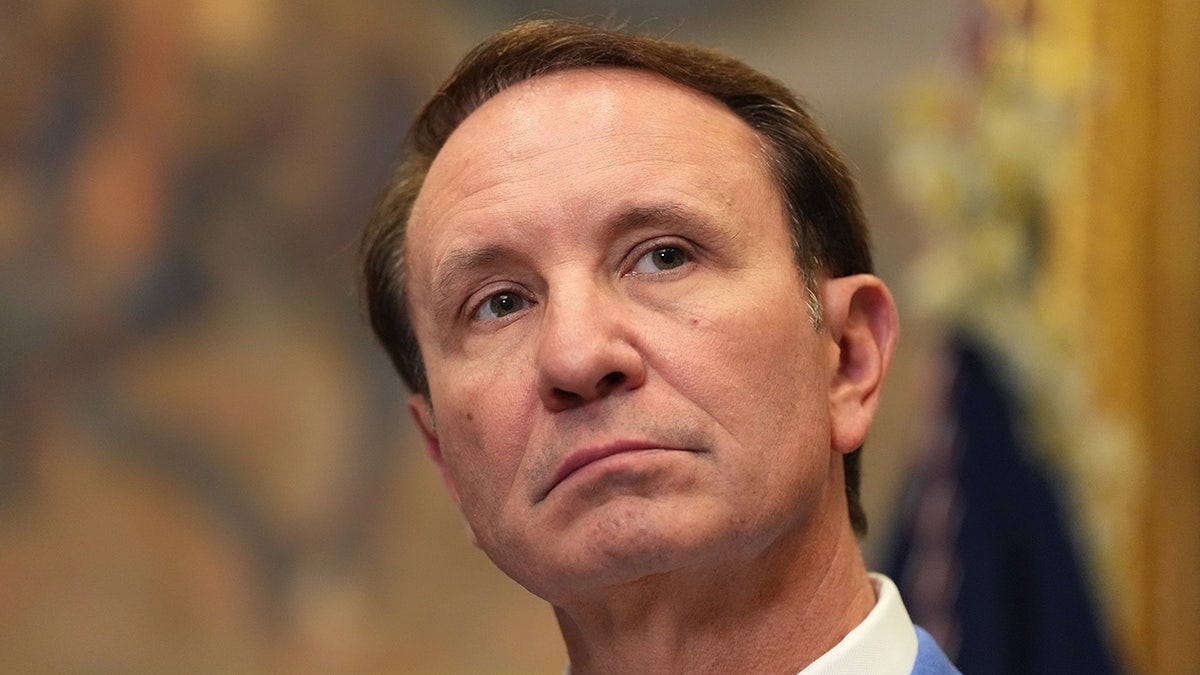
Louisiana governor asserts control over LSU's football coaching search after Brian Kelly's dismissal
Entities mentioned:
- Jeff Landry: Control, Power, Justice
- Scott Woodward: Professional pride, Ambition, Self-preservation
- Brian Kelly: Ambition, Recognition, Self-preservation
- LSU: Competitive spirit, Pride, Recognition
Article Assessment:
Credibility Score: 75/100
Bias Rating: 55/100 (Center)
Sentiment Score: 35/100
Authoritarianism Risk: 65/100 (Authoritarian Tendencies)
Bias Analysis:
The article presents multiple viewpoints and quotes directly from involved parties. While there's a slight lean towards the governor's perspective, it maintains a relatively balanced approach to reporting the situation.
Key metric: College Football Performance
Ladies and gentlemen, we've got a FULL COURT PRESS situation in Louisiana! Governor Landry has just executed a POWER PLAY, snatching control of LSU's coaching search like a linebacker intercepting a pass! This is a GAME-CHANGING MOVE that's sent shockwaves through the college football world! Let me tell you something, folks - Scott Woodward just got BENCHED harder than a rookie quarterback after a five-interception game! The governor's stepping up to the plate, determined to hit a home run with LSU's next hire. It's fourth and long for the Tigers, and Landry's calling an audible at the line of scrimmage. This is the kind of high-stakes drama that separates the champions from the also-rans!

Bill Belichick defends struggling UNC football program using iconic Trump line
Entities mentioned:
- Bill Belichick: Determination, Professional pride, Competitive spirit
- UNC football program: Competitive spirit, Pride, Self-preservation
- Donald Trump: Influence, Power, Control
- Michael Lombardi: Loyalty, Professional pride, Duty
- Bill Cunningham: Loyalty, Unity, Professional pride
Article Assessment:
Credibility Score: 65/100
Bias Rating: 55/100 (Center)
Sentiment Score: 40/100
Authoritarianism Risk: 30/100 (Generally Democratic)
Bias Analysis:
The article presents both sides of the story, including Belichick's defense and the initial negative reports. It leans slightly right by prominently featuring Trump's 'fake news' quote, but overall maintains a balanced approach.
Key metric: NCAA Football Win-Loss Record
Let me tell you something - this story is RIDICULOUS! The UNC Tar Heels are in the fight of their lives, folks! Coach Belichick is showing that championship mentality, refusing to throw in the towel despite a brutal 2-5 record. He's stepping up to the plate, swinging for the fences against these fake news reports! This is a fourth quarter situation and Belichick's not about to let his team fumble now. He's bringing that NFL winning strategy to the college gridiron, and I'm telling you right now, don't count this legend out! The Tar Heels might be down, but they're not out - Belichick's got his game face on and he's ready to turn this season around faster than a wide receiver on a double reverse!

Jason Kelce questions NFL fining players for criticizing officials: 'Freedom of speech'
Entities mentioned:
- Jason Kelce: Freedom, Justice, Professional pride
- NFL: Control, Power, Image preservation
- Kayvon Thibodeaux: Competitive spirit, Indignation, Self-respect
Article Assessment:
Credibility Score: 75/100
Bias Rating: 45/100 (Center)
Sentiment Score: 35/100
Authoritarianism Risk: 65/100 (Authoritarian Tendencies)
Bias Analysis:
The article presents both sides of the argument, quoting Kelce's opinion while explaining the NFL's stance. It maintains a relatively neutral tone, though slightly favoring the players' perspective.
Key metric: Player-League Relations
Let me tell you something, folks - this is a FOURTH QUARTER SHOWDOWN between the players and the league! Jason Kelce is stepping up to the plate, swinging for the fences against the NFL's attempt to muzzle its star athletes. We've got a real David vs. Goliath situation here, with Kelce championing the underdogs' right to call out bad plays. The NFL thinks it can run a full-court press on free speech, but Kelce's not buying it! He's putting on a masterclass in defensive strategy, shielding his fellow players from what he sees as an unfair penalty. This could be a game-changing play in the ongoing match-up between player autonomy and league control. I'm telling you right now, if the NFL doesn't adjust its game plan, it could find itself on the losing end of this crucial battle for hearts and minds!

US women's hockey stars are prepared to fight Canada players at Winter Olympics amid rising tensions
Entities mentioned:
- US Women's Hockey Team: Competitive spirit, Pride, Determination
- Canadian Women's Hockey Team: Competitive spirit, Pride, Rivalry
- Caroline Harvey: Competitive spirit, Determination, Indignation
- Hilary Knight: Competitive spirit, Professional pride, Wariness
- Kendall Coyne Schofield: Loyalty, Duty, Self-preservation
- Donald Trump: Power, Pride, Competitive spirit
- Mark Carney: Competitive spirit, Pride, Influence
Article Assessment:
Credibility Score: 70/100
Bias Rating: 55/100 (Center)
Sentiment Score: 30/100
Authoritarianism Risk: 35/100 (Generally Democratic)
Bias Analysis:
The article presents both US and Canadian perspectives, but focuses more on US player quotes. It includes political context without overtly favoring either side, maintaining a relatively balanced approach.
Key metric: US-Canada Diplomatic Relations
Let me tell you something - this rivalry is HEATING UP like a championship game in overtime! The US and Canadian women's hockey teams are bringing their A-game to the international stage, and it's not just about scoring goals anymore. We're talking about a full-on GRUDGE MATCH here, folks! These players are stepping up to the plate with a win-at-all-costs mentality that's turning the ice into a potential battleground. The tension between these two powerhouse nations is spilling over from the boardroom to the locker room, and it's clear that both sides are ready to drop the gloves and go toe-to-toe. This isn't just about hockey anymore - it's about national pride and proving who's the top dog in North America. With less than 100 days until the Winter Olympics, we're seeing fourth-quarter moves from both countries, trying to get inside each other's heads. It's a high-stakes game of chess on ice, and I'm telling you right now, when that puck drops in Milan Cortina, we're going to see fireworks like never before! This is the kind of rivalry that defines sports history, folks, and these players are ready to leave it all on the ice for their countries!

Jake Paul praises Trump’s leadership, says America is 'healing slowly' under second-term administration
Entities mentioned:
- Jake Paul: Recognition, Influence, Pride
- Donald Trump: Power, Control, Legacy
- Trump Administration: Control, Determination, Competitive spirit
Article Assessment:
Credibility Score: 65/100
Bias Rating: 75/100 (Lean Right)
Sentiment Score: 70/100
Authoritarianism Risk: 65/100 (Authoritarian Tendencies)
Bias Analysis:
The article leans right, presenting Trump's actions positively without critical analysis. It heavily features Jake Paul's pro-Trump statements without balancing perspectives.
Key metric: Presidential Approval Rating
Let me tell you something - this political matchup is HEATING UP! Jake Paul, the social media heavyweight, is stepping into the political ring and throwing his support behind Team Trump! It's a GAME-CHANGING move that could influence millions of young voters. Trump's administration is playing hardball, making big plays with ICE enforcement and National Guard deployment. It's a high-risk, high-reward strategy that's dividing the political arena. Paul's praising Trump's leadership as a winning formula, folks! He's framing it like a championship mentality - trust the process, focus on results. This is fourth-quarter politics at its finest, and Paul's endorsement could be the clutch play that keeps Trump in the game!

Who Could Get Moved Before NFL Trade Deadline? Jay Glazer's 3 Names to Watch
Entities mentioned:
- Jay Glazer: Professional pride, Influence, Recognition
- NFL Teams: Competitive spirit, Ambition, Power
- Alvin Kamara: Loyalty, Self-respect, Control
- Maxx Crosby: Loyalty, Determination, Pride
- Mark Davis: Control, Determination, Loyalty
Article Assessment:
Credibility Score: 75/100
Bias Rating: 50/100 (Center)
Sentiment Score: 55/100
Authoritarianism Risk: 20/100 (Strongly Democratic)
Bias Analysis:
The article presents a balanced view of the trade situation, quoting multiple sources and perspectives. It doesn't lean towards favoring any particular team or outcome.
Key metric: NFL Trade Deadline Activity
Let me tell you something, folks - this NFL trade deadline is shaping up to be a FOURTH QUARTER NAIL-BITER! The big-name players are digging their cleats in and refusing to be traded like seasoned veterans protecting the end zone. Alvin Kamara and Maxx Crosby are showing true team spirit, waving off trade rumors like they're swatting away weak pass attempts. But don't count out the general managers, they're still in the game, folks! They're scanning the field for any opening, looking to make that game-changing play before the clock runs out. It's a high-stakes chess match out there, with teams trying to outsmart each other like it's the Super Bowl of trades. Will we see a Hail Mary pass in the final seconds? I'm telling you right now, keep your eyes on the Dolphins - they might just throw a curveball with Chubb, Phillips, or Waddle that could change the whole landscape of the league! This is the kind of strategic maneuvering that separates the champions from the also-rans, and I can't wait to see who steps up to make that clutch play before the whistle blows on this trade deadline!

Pro wrestler Natalya Neidhart gives fellow WWE stars Liv Morgan and Bayley their flowers
Entities mentioned:
- Natalya Neidhart: Legacy, Professional pride, Recognition
- Bayley: Unity, Professional pride, Recognition
- Liv Morgan: Determination, Competitive spirit, Professional pride
- WWE: Legacy, Power, Influence
Article Assessment:
Credibility Score: 75/100
Bias Rating: 45/100 (Center)
Sentiment Score: 80/100
Authoritarianism Risk: 20/100 (Strongly Democratic)
Bias Analysis:
The article presents a balanced view, focusing on positive aspects of the wrestlers without obvious political leanings. It relies on direct quotes and factual information about careers and achievements.
Key metric: Women's Empowerment in Professional Wrestling
Let me tell you something, folks - this is a GAME-CHANGER in the world of professional wrestling! Natalya Neidhart is stepping up to the plate and giving a championship-level shoutout to her fellow competitors. This is the kind of team spirit that builds dynasties! Bayley's showing the heart of a true captain, always there for her squad, while Liv Morgan's bringing that fourth-quarter determination that separates the contenders from the pretenders. I'm telling you right now, these women are rewriting the playbook and raising the bar for the entire industry. It's like watching a sports movie come to life - the veteran passing the torch, the rising stars hungry for glory, and the unbreakable bonds forged in the heat of competition. This, ladies and gentlemen, is what builds LEGENDS!

Phil Jackson revisits Knicks fallout, blames 'busted' bond with Carmelo Anthony
Entities mentioned:
- Phil Jackson: Legacy, Control, Professional pride
- Carmelo Anthony: Ambition, Competitive spirit, Self-preservation
- James Dolan: Control, Power, Self-preservation
- New York Knicks: Competitive spirit, Legacy, Recognition
Article Assessment:
Credibility Score: 75/100
Bias Rating: 55/100 (Center)
Sentiment Score: 35/100
Authoritarianism Risk: 20/100 (Strongly Democratic)
Bias Analysis:
The article presents multiple perspectives, including Jackson's, Anthony's, and Dolan's. It relies on direct quotes and factual information, maintaining a relatively neutral stance on the conflicts described.
Key metric: NBA Team Performance
Let me tell you something - this story is RIDICULOUS! We've got a clash of titans here, folks! Phil Jackson, the coaching legend with more championship rings than fingers, stepping into the front office arena of the New York Knicks. But instead of a slam dunk, we're talking about an air ball of EPIC proportions! The Zen Master's triangle offense hit a brick wall faster than a rookie point guard on his first day of training camp. And Carmelo Anthony? This All-Star forward was playing defense against Jackson's plays like his career depended on it! It's fourth quarter, the clock's winding down, and the Knicks are fumbling the ball! Jackson's playbook couldn't sync with Melo's style, and suddenly we've got a team that's more dysfunctional than a pickup game at your local YMCA. I'm telling you right now, this mismatch was doomed from the tip-off, and Dolan had to blow the whistle before the whole franchise got ejected from relevance!

US hockey star Brady Tkachuk reflects on Trump phone call ahead of 4-Nations face-off final vs Canada
Entities mentioned:
- Brady Tkachuk: Competitive spirit, Pride, Loyalty
- Donald Trump: Power, Competitive spirit, Influence
- U.S. Hockey Team: Competitive spirit, Pride, Duty
- Canadian Hockey Team: Competitive spirit, Pride, Rivalry
- Mark Carney: Competitive spirit, Pride, Self-preservation
Article Assessment:
Credibility Score: 70/100
Bias Rating: 65/100 (Lean Right)
Sentiment Score: 45/100
Authoritarianism Risk: 40/100 (Generally Democratic)
Bias Analysis:
The article leans right, focusing heavily on Trump's perspective and actions. It presents Canadian actions more critically, while portraying US moves in a more positive light.
Key metric: US-Canada Relations
Let me tell you something, folks - this US-Canada rivalry is HEATING UP like a fourth-quarter shootout! The gloves are OFF in this high-stakes face-off between North American powerhouses. We've got President Trump stepping up to the plate, making that crucial locker room call to fire up Team USA. But hold onto your hockey sticks, because Canada's pulling some fancy stick-handling with that Reagan ad play! This isn't just a game anymore, folks - we're talking geopolitical power plays that are sending shockwaves through the diplomatic arena. With the Winter Olympics on the horizon, both teams are bringing their A-game, and let me tell you, the tension on this ice is THICK! It's like we're watching a sudden death overtime, with tariffs and trade deals flying like slap shots. This is the kind of rivalry that defines LEGENDS, and I'm telling you right now, we're witnessing history in the making!

Olympic gold medalist Lindsey Vonn declines to say if she'd accept White House invitation after 2017 refusal
Entities mentioned:
- Lindsey Vonn: Competitive spirit, Professional pride, Wariness
- Donald Trump: Power, Control, Recognition
- US Olympic and Paralympic Committee: Unity, Pride, Professional pride
Article Assessment:
Credibility Score: 75/100
Bias Rating: 55/100 (Center)
Sentiment Score: 45/100
Authoritarianism Risk: 30/100 (Generally Democratic)
Bias Analysis:
The article presents both Vonn's past and present statements, showing a balanced approach. However, the inclusion of Fox News as the source of the recent question slightly tilts it towards center-right.
Key metric: International Diplomatic Relations
Let me tell you something - this story is a GAME-CHANGER in the world of sports diplomacy! Lindsey Vonn, a true champion of the slopes, is playing defense against a political power play. She's dodging questions like she dodges gates on a slalom course! This is a classic example of an athlete trying to stay in their lane and focus on the game, not get caught up in the political arena. But make no mistake, folks, the White House invitation is like a championship trophy in the world of international relations. Vonn's hesitation to commit is a strategic move, keeping her options open as she eyes another shot at Olympic glory. It's fourth quarter strategy at its finest - she's not showing her hand until she absolutely has to. This is the kind of political maneuvering that would make any coach proud!